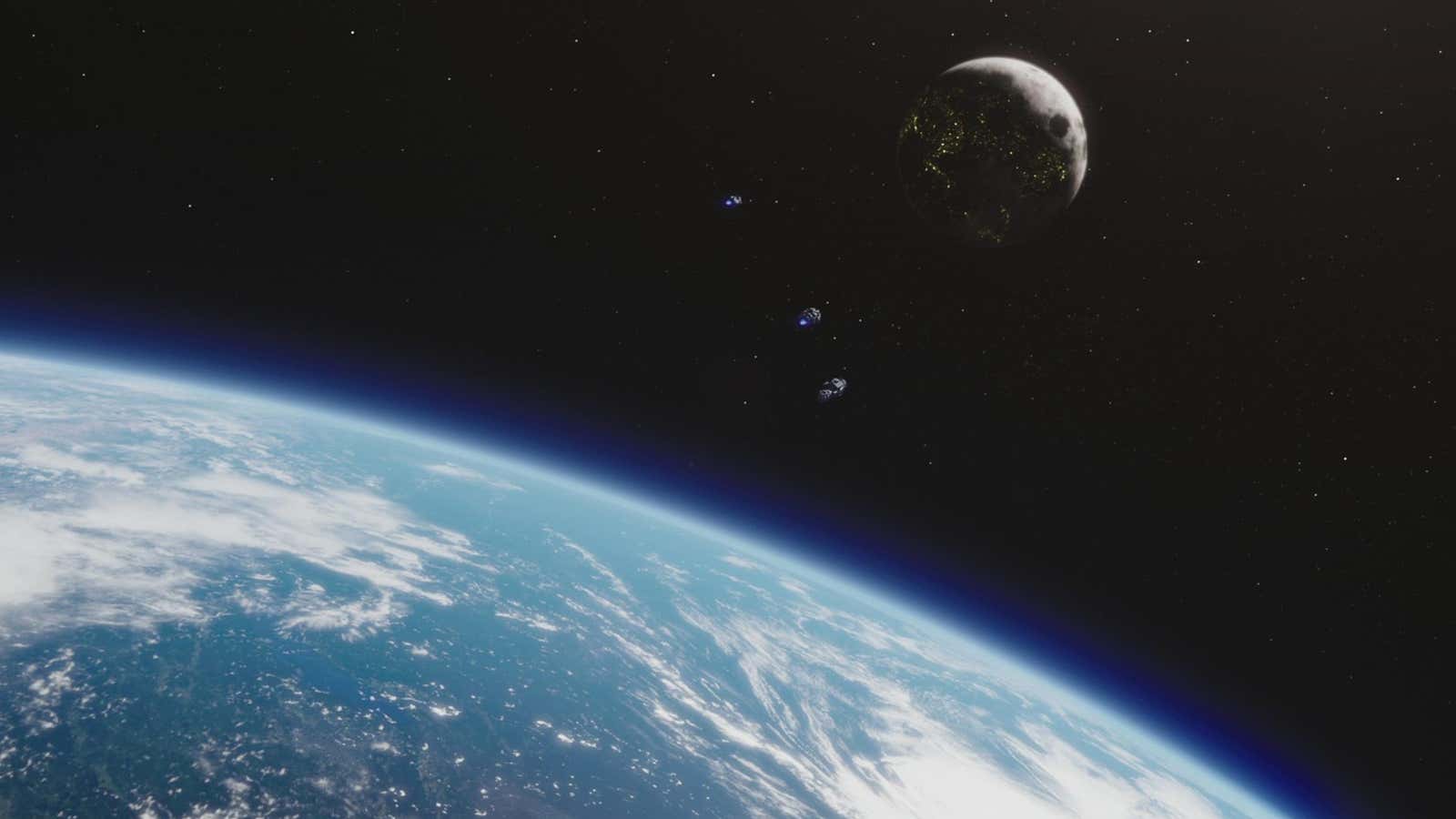For the last year, some 250 million miles from Earth, an American spacecraft called Dawn has been orbiting Ceres, a dwarf planet—really a big asteroid—between Mars and Jupiter. It is Dawn’s second stop within the asteroid belt: Four years ago, it took a close look at Vesta, another protoplanet. Depending on what NASA decides, it may travel to yet a third.
Dawn’s presence at Ceres coincides with the emergence of a colossal new space fetish, one that combines the vision of the 1960s Apollo missions, the magic of Star Wars in the 1970s, and the tech boom of the 1990s and 2000s, not to mention the quixotic flavor of the longstanding search for alien life. This time, NASA, Hollywood, and a clutch of Silicon Valley billionaires are separately fixated on the stretch of outer space from Mars to Saturn, with all the asteroids and moons in between. They want to get there, live there, and, even for those just shooting movies about it, make a lot of money while doing so.
Google co-founder Larry Page and billionaire entrepreneur Richard Branson are among this group, partners in a way-out venture to mine asteroids. NASA has plans for numerous space flights to the outer Solar System, while SpaceX’s Elon Musk aims to put people on Mars even before NASA does.
Hollywood is capitalizing on this idée fixe, too. Oddly enough, it is the entertainment industry’s entree into this world that elevates the strange talk of asteroid colonization from just another hyped obsession to serious social philosophy. It is one thing to wish humans into space-based cities in which everyone gets to be Neil Armstrong; it is quite another to do so in a way that avoids a repeat of some of human history’s most shameful episodes.
If anyone cares to gander at the future world that Page, Branson, and Musk are obsessing over, The Expanse is a good place to start. The SyFy channel space thriller, based on the novels by James S.A. Corey, is set in the 2300s, when Earth and Mars are geopolitical rivals in space. Tens of millions of Earthers, as we are called, are living on Mars, in addition to the moons of Saturn, Jupiter, and Uranus, driven by the usual exploratory impulses, not to mention the crush of 30 billion souls populating Earth itself.
The most interesting scene of action is not the planets, but the mineral-rich asteroid belt between Mars and Jupiter, and in particular Ceres. The weirdly shaped rock is the outer solar system’s crime-ridden principal port, built out with dozens of layers of self-contained infrastructure, and home to 6 million permanent residents. Like a galactic New York, Ceres hosts an additional million people on any given day, arriving aboard commercial space vessels to offload goods, get repairs, and visit bars, brothels, and shops.
This is a complex society in which Eros, Ganymede, and Phoebe are the familiar Londons, Shanghais, and Johannesburgs of today. But keeping all those people alive is quite another matter. Vegetables and animals are raised on the moons of Jupiter and Saturn; ice gathered from Saturn’s rings is melted for drinking water; and minerals are mined from the asteroids. All of this requires labor.
Which brings us to the Belters, the solar system’s asteroid-dwelling population and work force. Over the 10 or 15 generations of permanent space colonization, the Belters have effectively evolved into their own race. They are conspicuous physically, with slender, tallish bodies, the result of the years spent in low gravity. They are aurally distinct, too, with their own tongue—Belter, a creole mish-mash of the many languages and dialects of Earth’s original space pioneers.
Social consequences unfold. There is a tense divide between the dwellers of the inner planets—Earth and Mars—and the Belters, who dominate space beyond. The proud and restive Belters hold fast to a felt moral superiority familiar to repressed peoples through history, seemingly prepared at any moment to rise up in indignant protest of second-rate treatment by the languid and entitled inner-planeters. The supercilious Earth and Mars dwellers are just as determined to hold the Belters down.
When the infectious Musk hastens us to colonize Mars in a “great adventure,” a binge-watch of the first season of The Expanse—and, once you are hooked, a read of Leviathan Wakes, the first book of the series—offers a sobering splash of cold water. For the Belters, we see, colonization has evolved into not-so-soft apartheid.
This is drama—a space opera, says Ty Franck, co-author of the books along with Daniel Abraham, writing under the collective pen name James S.A. Corey. Despite the way-out narrative, the plot line feels authentic, an effect in no small part produced by dialogue that abruptly whips into the Belter language, a tongue created for the show and rendered without subtitles (see this story for more on that).
The insight of The Expanse is that, contrary to the assumptions of so many blockbuster sci-fi authors, the greatest danger in space is not necessarily aliens. It is how law and custom become established for those who settle out there.
The story foretells a future population on Mars starting over where Earth went wrong—attempting to create a more just society. But as civilization spreads further, it succumbs to some of the worst social and economic fault lines that have dogged humans since their origins. The Expanse contains a deeper, stinging allegory for our own times as well, a look from a distance at the anger in our midst, and fateful decisions yet to be made.
With their talk of space mining and colonization, Musk and Page give us a gee-whiz, all-but-blithe technological vision of the future. It has fallen to Hollywood to provide the social, cautionary one.
